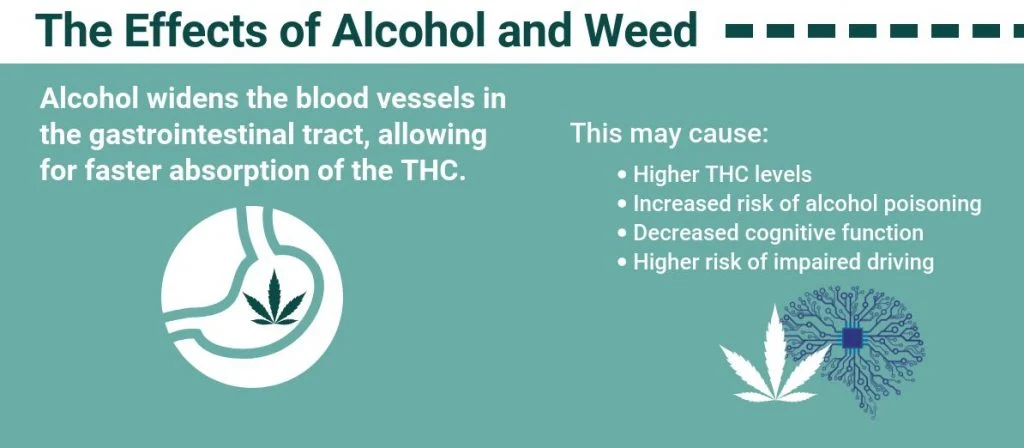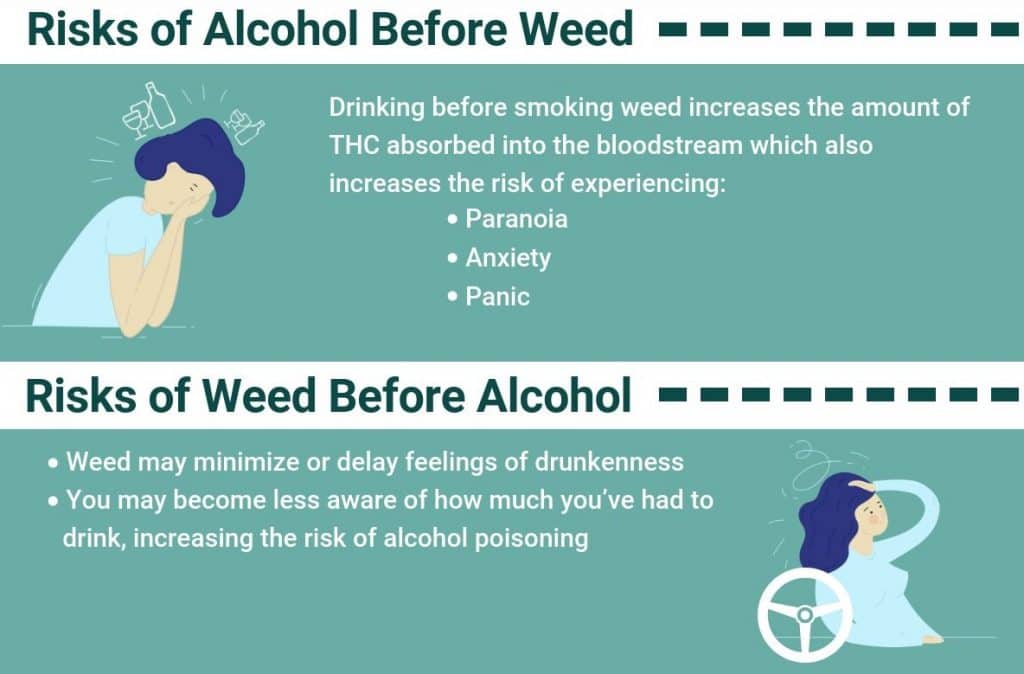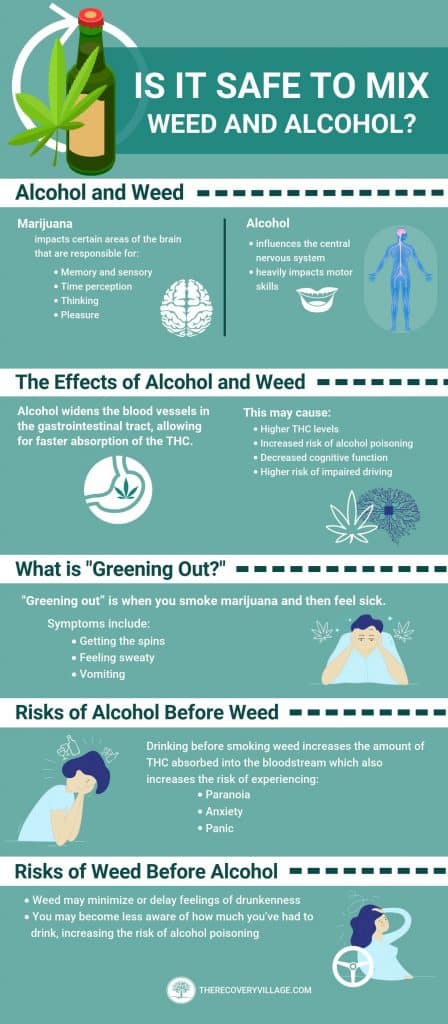People may use alcohol and marijuana together, but their combined effects can increase your risk of higher THC levels, greater impairment and alcohol poisoning.
It is common for people to mix alcohol and marijuana. In fact, marijuana is the most frequently used substance among drinkers. People may use a combination of these substances to get more of an effect for both or combat the side effects of one or the other, but it can be risky and unsafe.
Article at a Glance:
- Using alcohol and marijuana in combination increases your risk of experiencing uncomfortable side effects due to increased absorption of THC.
- Using a combination of alcohol and marijuana can lead to a greater degree of impairment than either on its own.
- When you combine alcohol and marijuana, you’re more likely to experience “greening out,” which is a sick feeling following the use of marijuana.
- Using marijuana and alcohol in combination can make alcohol poisoning more likely, which can be life-threatening.
The Effects of Mixing Alcohol & Marijuana
When someone uses alcohol and marijuana together, they might start to notice they feel the effects of one (or both) much more quickly and more pronounced than otherwise.
Marijuana and alcohol both impact the central nervous system. Marijuana impactsareas of the brainresponsible for memory, thinking, pleasure and perceiving time and senses.Alcohol is a depressantthat affects the entire central nervous system, heavily impactingmotor skills, judgment, cognition and memory.

One of the main active ingredients in marijuana is tetrahydrocannabinol (THC). THC and alcohol are both psychoactive. THC acts on cannabinoid receptors in the brain, whichcan lead tocognitive effects and impairments.
When people drink and smoke marijuana together, alcoholincreasesthe amount of THC that isabsorbedinto the body. While this means that people who use an alcohol and marijuana combination may report a “higher high,” the lows can also become amplified. For example, impaired judgment symptoms are more obvious.

What Are the Risks?
While people might use a combination of alcohol and marijuana to experience a more intense high, this can be dangerous. The effects of marijuana and alcohol on their own are unpredictable, and combining them makes this worse. You can absorb THC more quickly when there’s alcohol in your blood, which can increase the risk of experiencing uncomfortable side effects.
Combining the two substances also leads to agreater degree of impairmentthan taking either one on its own. This can increase your risk for accidents and injury. You may put yourself in risky or dangerous situations if you’re drinking or using marijuana, and an alcohol and marijuana combination makes this even more likely.
It’s also important to note that if you regularly use an alcohol and marijuana combination, you’re at a higher risk ofdeveloping a dependenceon one or both of the substances. Further, if you try to cut back on either alcohol or cannabis, your reliance on the other substance islikely to increase.

What Is Greening Out?
If you’re researching the safety of mixing marijuana and alcohol, you may come across the term “greening out.” It refers to a person feeling sick after smoking marijuana. This can happen with marijuana use on its own, but with an alcohol and marijuana combination, it’s more likely to happen due to thehigher THC levelswhen you drink.
How To Handle a Bad Reaction
If a person has been drinking and smoking weed, higher THC levels in their blood from drinking may increase the risk of a bad reaction. Because physical and mental impairment can bemore pronouncedwhen you combine cannabis and alcohol, it can be hard to know if someone’s symptoms are due to a marijuana green-out or excessive alcohol intake.
Because alcohol poisoning can be deadly, it is best to seek medical attention to make sure that your symptoms are not due to a dangerous blood alcohol level.
While awaiting medical attention, it is important to keep the person safe from harm. Thisincludespreventing injury and providing reassurance and emotional support.
Can You Overdose On Alcohol & Marijuana?
Another risk of an alcohol and marijuana combination is that you may take too much of either substance. Although using too much marijuana isn’t usually life-threatening, inhalation burns and asthma attacks from smoking cannabiscan be deadly.
Drinking too much alcohol can be lethal. If you’re using an alcohol and marijuana combination, you can be more likely to getalcohol poisoning, which can be fatal.
When To Get Help
It is important to seek emergency medical help if you suspect a person is experiencing alcohol poisoning. Because a person becomes more impaired when they mix alcohol and marijuana, it can be hard to tell if a person is reacting to too much drink or too much cannabis. The signs of alcohol poisoninginclude:
- Confusion
- Problems staying conscious
- Vomiting
- Seizures
- Slow or irregular breathing
- Slow heartbeat
- Clammy skin
- Dulled reflexes
- Bluish or pale skin color
Alcohol poisoning can be fatal. If you suspect someone is experiencing alcohol poisoning, call911immediately. Do NOT be afraid to seek help.If you do not have access to a phone contactWeb Poison Control Servicesfor online assistance.
You shouldn’t mix marijuana and alcohol. If you think you’re abusing these or other substances, help is available.Contact usto speak with an intake coordinator who can answer your questions and help you understand what options may be available to you.















